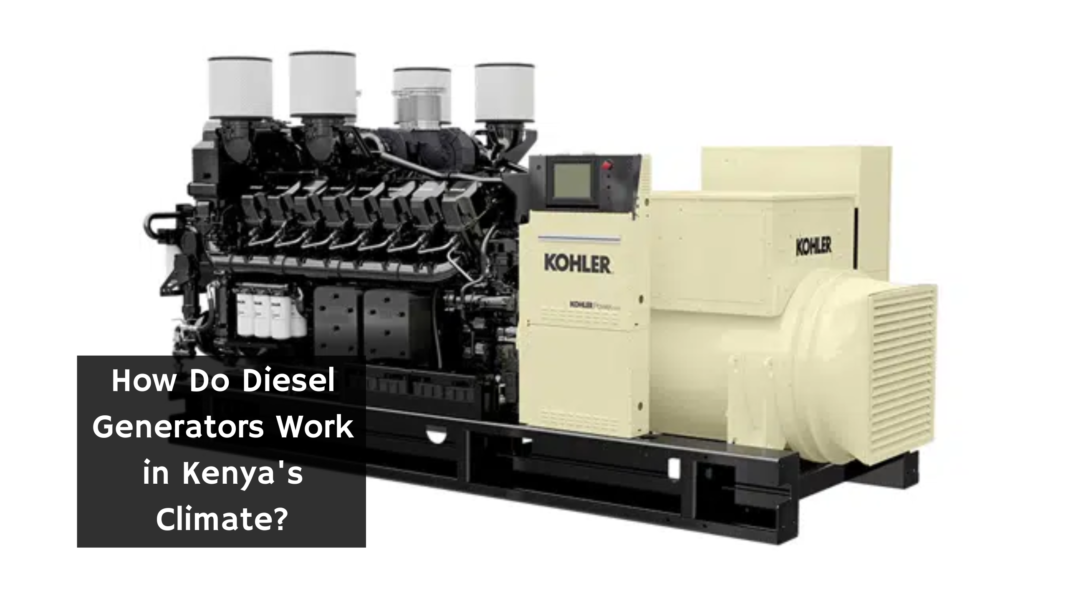Diesel generators are an essential source of power in many regions worldwide, including Kenya, where reliable electricity is critical for both residential and commercial operations. This article explores the mechanics of diesel generators, their functionality in the context of Kenya’s climate, and the factors affecting their performance.
Understanding Diesel Generators
What is a Diesel Generator?
A diesel generator is a machine that converts diesel fuel into electrical energy. It consists of two main components: a diesel engine and an electric generator (alternator). The engine generates mechanical energy by burning diesel fuel, while the generator converts this mechanical energy into electrical energy.
NOTE: Diesel generators in Kenya provided reliable power solutions for numerous businesses. Many companies relied on them to overcome electricity shortages. Blackwood Hodge offered quality generators that ensured uninterrupted service. If you experienced power challenges, you should have contacted Blackwood Hodge for dependable solutions.
Key Components of a Diesel Generator
- Diesel Engine: The heart of the generator, responsible for converting diesel into mechanical energy through combustion.
- Alternator: Converts mechanical energy into electrical energy. It consists of a rotor and a stator.
- Fuel System: Includes the fuel tank, fuel pump, and filters, ensuring a continuous supply of diesel to the engine.
- Cooling System: Maintains the engine’s temperature within optimal limits to prevent overheating.
- Exhaust System: Disposes of combustion gases safely, ensuring efficient operation and compliance with environmental standards.
How Diesel Generators Operate
The Diesel Combustion Process
The operation of a diesel generator begins with the injection of diesel fuel into the engine’s combustion chamber. The engine’s pistons compress the air in the chamber, raising its temperature. At the peak of compression, the fuel is injected, igniting due to the high temperature. This combustion pushes the pistons down, generating mechanical power.
Power Generation
The mechanical power produced by the engine is transmitted to the alternator, where it spins the rotor within the stator. As the rotor spins, it creates a rotating magnetic field, inducing an electrical current in the stator windings. This process generates alternating current (AC), which can then be used for various applications.
The Impact of Kenya’s Climate on Diesel Generators
Kenya’s climate is diverse, ranging from the humid coastal regions to the arid north and the temperate highlands. These variations can influence the performance and efficiency of diesel generators.
Temperature Variations
- High Temperatures: In areas like the Northern and Eastern parts of Kenya, where temperatures can soar above 30°C (86°F), diesel engines may experience increased wear and tear. High ambient temperatures can lead to overheating, making efficient cooling systems essential for maintaining performance and extending the life of the generator.
- Humidity Levels: Coastal regions of Kenya experience high humidity, which can lead to condensation in the fuel system. This can cause fuel degradation and the growth of bacteria, which can clog filters and injectors. Regular maintenance and the use of quality fuel can mitigate these issues.
Altitude Effects
Kenya’s varied altitudes can also affect diesel generator performance. High-altitude areas, such as Nairobi and parts of the Rift Valley, have lower air density. This results in less oxygen available for combustion, which can reduce engine power output. Diesel generators operating in these areas may require tuning adjustments to optimize performance.
Fuel Considerations in Kenya
Diesel Quality
The quality of diesel fuel used in generators is critical for optimal performance. In Kenya, the availability of high-quality diesel varies by region. Poor-quality fuel can lead to inefficient combustion, increased emissions, and engine fouling. Therefore, users should source fuel from reputable suppliers and consider using additives to improve fuel stability and performance.
Fuel Supply and Storage
Kenya’s fuel supply chain can be affected by logistical challenges, especially in remote areas. Ensuring a reliable fuel supply is crucial for the uninterrupted operation of diesel generators. Proper storage facilities that protect diesel from contamination and evaporation are essential for maintaining fuel quality.
Maintenance of Diesel Generators
Regular Maintenance Practices
To ensure longevity and efficient operation, regular maintenance of diesel generators is essential. Key maintenance practices include:
- Oil Changes: Regular oil changes prevent engine wear and ensure smooth operation. Users should follow the manufacturer’s guidelines for oil change intervals.
- Fuel Filter Replacement: Fuel filters should be replaced regularly to prevent clogging and ensure a clean fuel supply to the engine.
- Cooling System Checks: Regular checks of the cooling system can help prevent overheating. This includes monitoring coolant levels and inspecting hoses for leaks.
- Battery Maintenance: Batteries should be checked and maintained to ensure reliable starting, especially in colder temperatures.
Importance of Professional Servicing

While routine maintenance can be conducted by the owner or operator, professional servicing is recommended for complex issues. Technicians with experience in diesel generators can identify potential problems before they escalate, ensuring the generator operates efficiently.
The Role of Diesel Generators in Kenya’s Energy Landscape
Meeting Energy Demands
With ongoing challenges in electricity supply, particularly in rural and remote areas, diesel generators play a vital role in bridging the energy gap. They provide reliable power for homes, businesses, and essential services, contributing to economic growth.
Environmental Considerations
While diesel generators are crucial for energy supply, they also raise environmental concerns. Diesel combustion produces emissions that can contribute to air pollution. In response, Kenya is promoting cleaner energy sources, such as solar and wind power. However, diesel generators remain a practical solution for immediate energy needs, especially in areas lacking infrastructure.
Conclusion
In summary, diesel generators are a critical component of Kenya’s energy landscape, providing reliable power in diverse climatic conditions. Understanding how these generators operate and the factors affecting their performance is essential for effective utilization. By maintaining these systems properly and being aware of the unique challenges posed by Kenya’s climate, users can ensure efficient and reliable power generation for their needs. As Kenya continues to advance its energy solutions, diesel generators will remain a vital resource for many communities.
For More Isightful Articles Related To This Topic, Feel Free To Visit: mstravaloo







